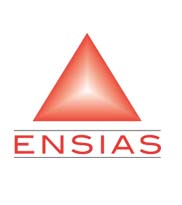- Accueil
-
L'Ecole
-
FORMATIONS
-
FORMATION INGENIEUR
-
Nouvelles filières offertes
- Ingénierie Intelligence Artificielle (2IA)
- Smart Supply Chain & Logistics (2SCL)
- Business Intelligence & Analytics (BI&A)
- Cybersécurité, Cloud et Informatique Mobile (CSCC)
- Data and Software Sciences (D2S)
- Génie de la Data (GD)
- Génie Logiciel (GL)
- Ingénierie Digitale pour la Finance (IDF)
- Smart System Engineering (SSE)
- REGLEMENT DES ETUDES DE L’ENSIAS CYCLE INGENIEUR
-
Nouvelles filières offertes
-
FORMATION INGENIEUR
- FORMATION CONTINUE
-
Recherche
- INTERNATIONAL
- ENTREPRISES
- VIE ESTUDIANTINE
- BIBLIOTHEQUE
LES DERNIÈRES INFORMATIONS
Matching Game with No-Regret Learning for IoT Energy-Efficient Associations with UAV
| Titre | Matching Game with No-Regret Learning for IoT Energy-Efficient Associations with UAV |
| Publication Type | Journal Article |
| Year of Publication | 2020 |
| Authors | Lhazmir, S, Oualhaj, OA, Kobbane, A, Ben-Othman, J |
| Journal | IEEE Transactions on Green Communications and Networking |
| Volume | 4 |
| Pagination | 973-981 |
| Mots-clés | Antennas, Cost effectiveness, Cost-effective solutions, energy efficiency, Fast data transmission, Game theory, Internet of things, Internet of Things (IOT), Noncooperative game, Optimal utilization, Reliable connections, Signal interference, Signal to interference plus noise ratio, Signal to noise ratio, Total transmit power, Unmanned aerial vehicles (UAV) |
| Abstract | Unmanned aerial vehicles (UAVs) are a promising technology to provide an energy-efficient and cost-effective solution for data collection from ground Internet of Things (IoT) network. In this paper, we analyze the UAV-IoT device associations that provide reliable connections with low communication power and load balance the traffic using analytical techniques from game theory. In particular, to maximize the IoT devices' benefits, a novel framework is proposed to assign them the most suitable UAVs. We formulate the problem as a distributed algorithm that combines notions from matching theory and no-regret learning. First, we develop a many-to-one matching game where UAVs and IoT devices are the players. In this subgame, the players rank one another based on individual utility functions that capture their needs. Each IoT device aims to minimize its transmitting energy while meeting its signal-to-interference-plus-noise-ratio (SINR) requirements, and each UAV seeks to maximize the number of served IoT devices while respecting its energy constraints. Second, a non-cooperative game based on no-regret learning is used to determine each IoT device's regret. Then, UAVs open a window for transfers to the IoT devices. Simulation results show that the proposed approach provides a low average total transmit power, ensures fast data transmission and optimal utilization of the UAVs' bandwidth. © 2017 IEEE. |
| URL | https://www.scopus.com/inward/record.uri?eid=2-s2.0-85096697293&doi=10.1109%2fTGCN.2020.3008992&partnerID=40&md5=7f2e844f54122845029dfd8503c5eaf6 |
| DOI | 10.1109/TGCN.2020.3008992 |
Revues:
LIENS UTILES
Localisation
Contactez-nous
ENSIAS
 Avenue Mohammed Ben Abdallah Regragui, Madinat Al Irfane, BP 713, Agdal Rabat, Maroc
Avenue Mohammed Ben Abdallah Regragui, Madinat Al Irfane, BP 713, Agdal Rabat, Maroc
![]() Télécopie : (+212) 5 37 68 60 78
Télécopie : (+212) 5 37 68 60 78
![]() Secrétariat de direction : 06 61 48 10 97
Secrétariat de direction : 06 61 48 10 97
Secrétariat général : 06 61 34 09 27
Service des affaires financières : 06 61 44 76 79
Service des affaires estudiantines : 06 62 77 10 17 / n.mhirich@um5s.net.ma
CEDOC ST2I : 06 66 39 75 16
Résidences : 06 61 82 89 77
- Compteur de visiteurs:635,454
Education - This is a contributing Drupal Theme
Design by WeebPal.
Design by WeebPal.



































